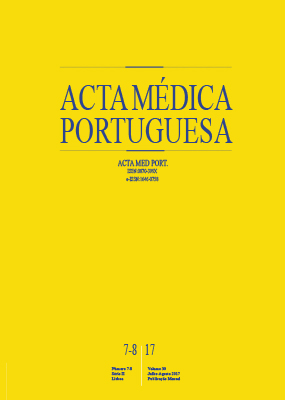Treatment of Anorexia Nervosa: The Importance of Disease Progression in the Prognosis
DOI:
https://doi.org/10.20344/amp.8963Keywords:
Anorexia Nervosa/therapy, Disease Progression, Prognosis, Treatment OutcomeAbstract
Introduction: Anorexia nervosa is a severe, usually chronic, life-threatening disease of complex etiology characterized by food restriction, overestimation of the importance of body weight and image, intense fear of weight gain and distortion of body image. Anorexia nervosa is associated with high rates of mortality, suicide and decreased quality of life. Our aim is to present an anorexia nervosa treatment program offered in a major university hospital in Portugal, and to determine the impact of illness duration before admission on the outcome. Our hypothesis is that patients with greater disease longevity may have worse prognosis and poorer outcome.
Material and Methods: The sample included data from case records of 169 patients seen consecutively and for the first time at Centro Hospitalar São João, between 2010 and 2015. We performed a retrospective observational study which included data collected at admission and from later follow-up years.
Results: From the initially selected patients, 14.8% reached total remission, 16% accomplished partial remission and 14.2% ended up with exacerbation/stagnation of the disease. The dropout rate was of 55% throughout our study period. We found significant differences on outcome rates between distinct illness duration groups (p = 0.007).
Discussion: There are several factors frequently associated with poor outcome for anorexia nervosa. The interpretation of outcome findings was limited by the high rate of dropout and lack of consistent definition criteria.
Conclusion: Our results support the idea that illness duration has an important role on the outcome and prognostic features of these patients.
Downloads
Downloads
Published
How to Cite
Issue
Section
License
All the articles published in the AMP are open access and comply with the requirements of funding agencies or academic institutions. The AMP is governed by the terms of the Creative Commons ‘Attribution – Non-Commercial Use - (CC-BY-NC)’ license, regarding the use by third parties.
It is the author’s responsibility to obtain approval for the reproduction of figures, tables, etc. from other publications.
Upon acceptance of an article for publication, the authors will be asked to complete the ICMJE “Copyright Liability and Copyright Sharing Statement “(http://www.actamedicaportuguesa.com/info/AMP-NormasPublicacao.pdf) and the “Declaration of Potential Conflicts of Interest” (http:// www.icmje.org/conflicts-of-interest). An e-mail will be sent to the corresponding author to acknowledge receipt of the manuscript.
After publication, the authors are authorised to make their articles available in repositories of their institutions of origin, as long as they always mention where they were published and according to the Creative Commons license.









